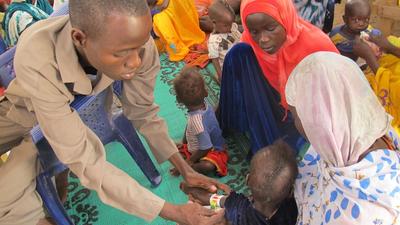Three years after Médecins Sans Frontières/Doctors Without Borders (MSF) began an intervention to improve access to sexual and reproductive health services in Luwingu district, Northern Province, the project closed in mid-September. The decision to close the programme was based on the improvement of medical indicators in the area and came after a long handover process with the Zambian Ministry of Health.
From the beginning of the project, in June 2010, and in close collaboration with Zambian authorities, MSF teams provided comprehensive sexual and reproductive health services – including family planning, ante and postnatal care and assisted births – in the Luwingu district hospital and several rural health centres. Emergency obstetric referrals were made from rural centres to the hospital.
Handover to Ministry of Health
“We decided to hand over the project to the Ministry of Health because the original objectives of our programme have been achieved,” said Víctor García Leonor, MSF head of mission for Zambia.
“However, there are remaining challenges in Luwingu. For example, although the deployment of qualified health workers has increased tremendously since MSF started working in the district, it is still below the desired standard.”
Until June 2013, when medical activities in Luwingu finished, MSF carried out approximately 11,775 prenatal consultations, 3,626 postnatal consultations and attended more than 2,700 deliveries.
Obstetric fistulas
MSF staff also identified and referred 56 cases of obstetric fistula, which were successfully repaired at the Chilonga hospital. Obstetric fistulas are a medical condition caused during prolonged labour, which results in pain and the leakage of faeces and urine.
Included in comprehensive sexual and reproductive health services was the prevention of mother-to-child transmission of HIV (PMTCT). More than 220 women were treated over the course of the programme.
Beyond direct medical activities, MSF also carried out several rehabilitation and construction works aimed at improving the provision of healthcare services.
Moreover, the project has developed a community approach involving several leaders and groups from the district to improve access to healthcare.
Training staff
One of the key components of the MSF programme was the training and capacity building of staff working in medical facilities.
In recent months, MSF has been working with several of the stakeholders at district and provincial levels to ensure a successful handover of activities. The organisation has also donated medicine and medical equipment to the health facilities.
Following the closure of Luwingu project, MSF will withdraw from Zambia in the coming weeks. However, the Emergency Unit of MSF will continue monitoring the situation in the country and is prepared to act if any emergency response is required.
MSF in Zambia
MSF has been working in Zambia since 1999, intervening in cholera and measles outbreaks and specific emergencies such as population displacement due to the effects of flooding. The organisation also ran an HIV/AIDS project in Kapiri and a sexual and reproductive healthcare project in Luwingu.
Find out more about MSF's work in Zambia




